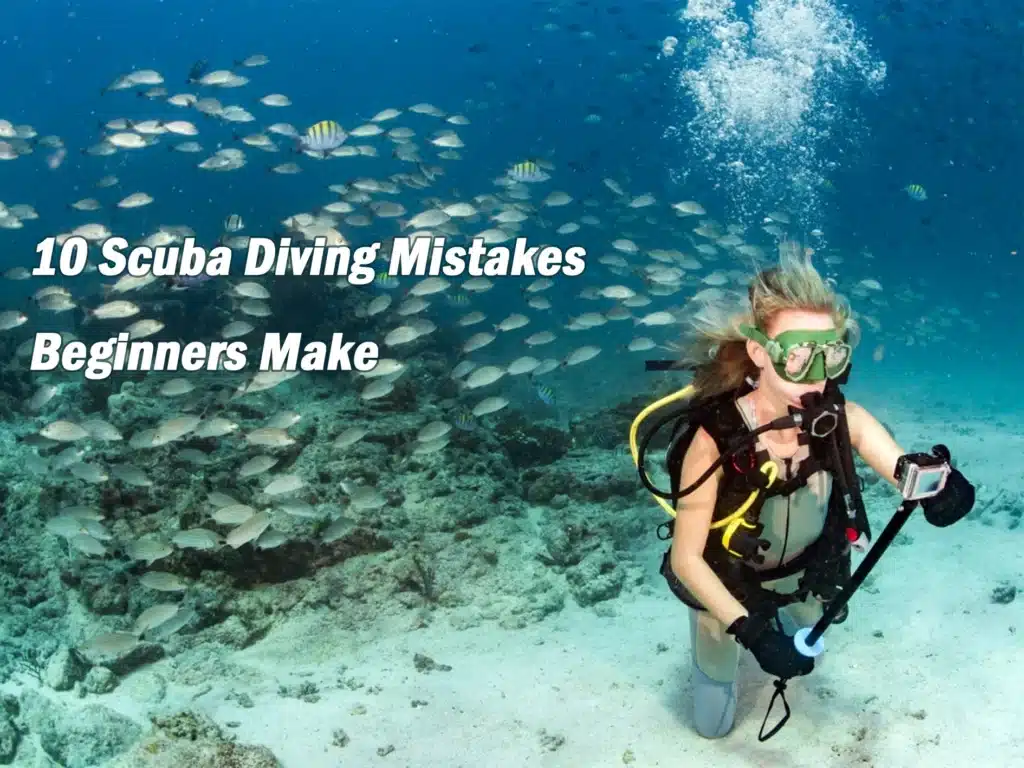Blog
10 Scuba Diving Mistakes Beginners Make
Scuba diving opens up a breathtaking underwater world, but beginners often make avoidable mistakes. As a PADI-certified dive instructor with 500+ logged dives, I’ve seen these errors repeatedly. Let’s fix them before your next dive!
1. Skipping the Pre-Dive Check (Buddy Check)
Mistake: Rushing into the water without properly inspecting gear, leading to issues like closed tank valves or loose weight belts.
How to Avoid:
- Use theBWRAF checklist (BCD, Weights, Releases, Air, Final Check).
- Ensure the tank valve is fully open and regulators are functioning.
2. Wearing Incorrect Weighting
Common error: Beginners average 2-4 lbs overweight (PADI training data).
Perfect weighting test:
- At surface with empty BCD
- Take normal breath and hold
- Water should line up with your eyes
- Exhale fully to slowly submerge
Pro tip: Neoprene compresses at depth – add 2 lbs for every 3mm wetsuit thickness below 30ft.
3. Poor Buoyancy Control
The damage: Each year, careless divers destroy ~4 square meters of coral (Reef.org).
Master neutral buoyancy:
- Inhale to rise slightly
- Exhale to descend gently
- Use trim position: slightly head-down, fins up
Training trick: Practice hovering motionless at safety stop depth.
4. Rapid Ascents
The risk: Ascending >30ft/min increases DCS risk by 300% (DAN statistics).
Safe ascent protocol:
- Begin ascent with 500 psi remaining
- Maintain continuous exhaling
- Stop at 15ft for 3+ minute safety stop
- Final ascent rate <1ft/second
5. Ignoring Ear Equalization
Medical fact: 40% of diving-related ear injuries come from failed equalization (Undersea Medical Society).
Equalization methods compared:
|
Method |
How To |
Effectiveness |
|
Valsalva |
Pinch nose, gently blow |
Good for beginners |
|
Frenzel |
Close throat, use tongue |
Advanced technique |
|
Toynbee |
Swallow while pinching nose |
Mid-dive adjustments |
6. Air Management Failures
Deadly statistic: 18% of diving fatalities involve air starvation (BSAC incident reports).
Air monitoring rules:
- Check gauge every 5 minutes
- Turn back at 1/2 tank (or 1/3 in strong currents)
- Surface with minimum 500 psi
7. Over-Reliance on Guides
Training gap: 68% of new divers can’t navigate without guide (SSI survey).
Essential self-reliance skills:
- Compass navigation patterns
- Natural landmark identification
- Dive computer interpretation
8. Touching Marine Life
Ecological impact: A single diver’s touch can kill coral polyps that took 50 years to grow.
Responsible diving practices:
- Maintain 3ft minimum distance
- Streamline equipment
- Use frog kick in delicate areas
Related Literature:Coral Reefs
9. Diving While Fatigued
Physiological fact: Fatigue doubles nitrogen absorption rate (Naval Medical Research).
Pre-dive wellness checklist:
- 8 hours quality sleep
- 16oz water 2 hours before dive
- Light meal 1-2 hours prior
- No alcohol for 24 hours
10. Equipment Neglect
Gear failure causes:
- 41% O-ring issues
- 29% regulator freeflows
- 18% BCD leaks (Dive Equipment Specialists Association)
Pre-dive maintenance:
- Rinse with fresh water after every dive
- Store in cool, dry place
- Annual professional servicing
- Visual inspection before each use
FAQ: Beginner Diver Questions Answered
Q: How often should I equalize?
A: Every 2-3 feet during descent, before feeling discomfort.
Q: What is the skill you need to practice first?
A: Buoyancy control – it affects everything from air consumption to safety.
Q: How many dives until I’m no longer a beginner?
A: Most divers gain basic competence around 20-30 logged dives.
Q: Should I buy gear as a beginner?
A: Start with mask, fins, computer – rent other gear until you’re committed.
By addressing these common mistakes with professional techniques, you’ll transform from anxious beginner to confident diver. Remember: Good divers have stories, great divers have logs. Stay safe and keep diving!
